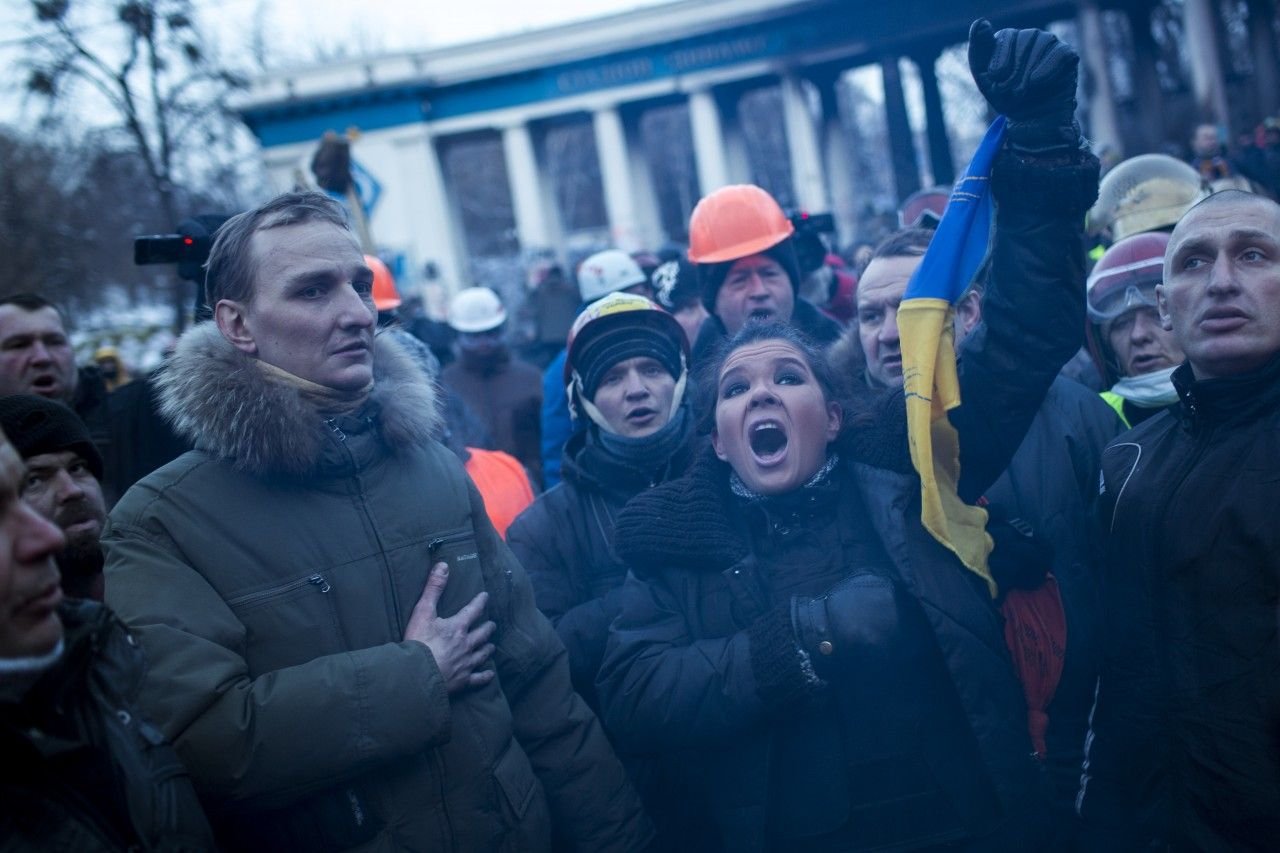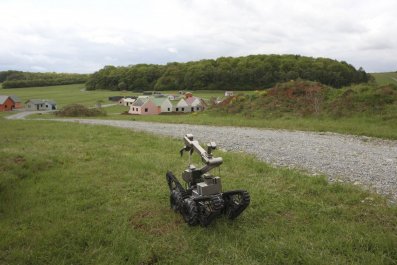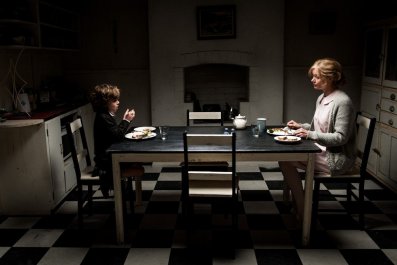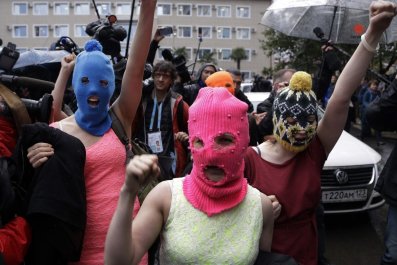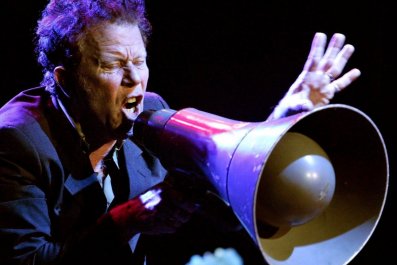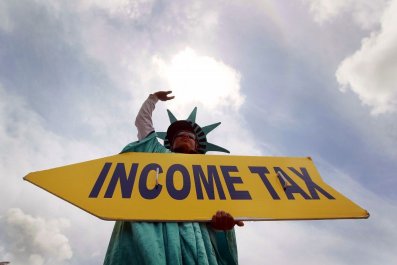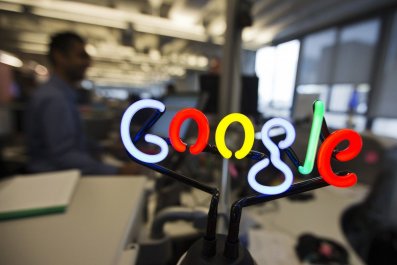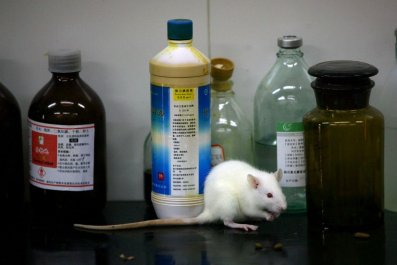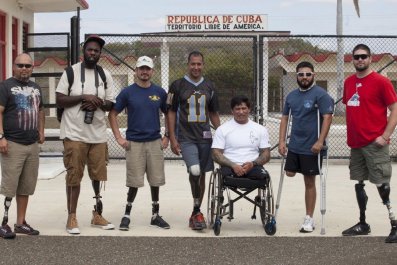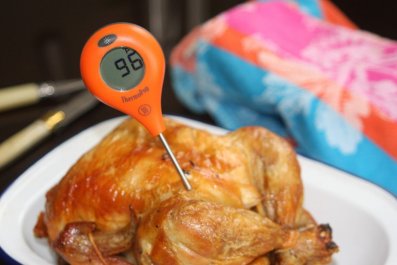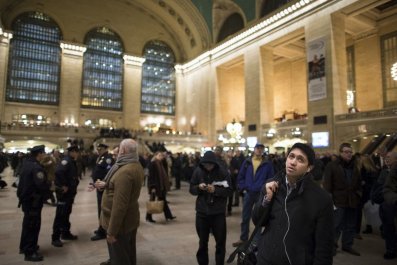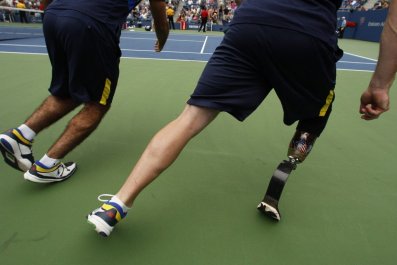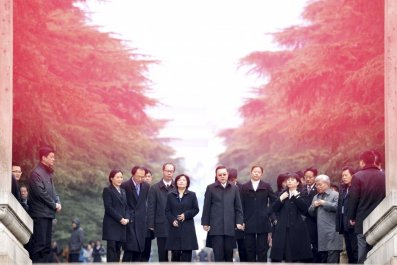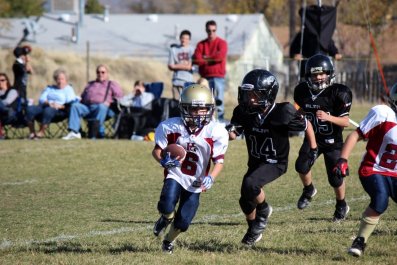On a freezing night in December, standing on a stage set up among tents and would-be revolutionaries in Maidan, Kiev's main square, the Ukrainian pop star Ruslana shouted to protesters to stay peaceful as police began to surround them.
"I am not afraid of your clubs! I am not afraid of your gas attacks!" Ruslana screamed into the microphone. "I am just a singer, singing songs for peace in Ukraine!"
Though the Ukrainian police force, the Berkut, attempted to break through barricades made of scrap wood and metal, protesters, energized by Ruslana's voice, managed to prevent a clash. Throughout the night, Ruslana repeatedly sang Ukraine's national anthem and her own songs, hopping up and down both to stay warm and urging protesters to sing and dance, too. Eventually, the Berkut retreated, and at dawn the Maidan was still at peace.
Ruslana described it as the "experience of a lifetime." At first, she told Newsweek, it was difficult to cope with fatigue and emotional stress. "But I always had a second wind," she said - perhaps similar to the EuroMaidan movement itself, reignited and stronger than ever after a lull last month.
"Special battalions looked for me in my car during the attempt to cleanse Maidan on Tuesday night, but I was on stage singing - it was music that saved me," Ruslana told the Daily Beast.
As the months roll on, Ruslana continues to put her life in danger, especially in light of the recent shootings around the Kiev parliament that has left at least 5 dead - the most violent clashes in weeks. She has received threats via phone calls and messages, and the "titushky" - government-paid "thugs" - watch her home and have attempted to break down the door of the apartment she currently stays in. Because of this, Ruslana is accompanied by protection "day and night," she told Newsweek.
When you imagine a pop princess, the first thing that comes to mind isn't a small 40-year-old woman dressed in layers of sweaters and coats, bouncing around amidst thousands of angry Ukrainians denouncing the corrupt government and the domineering hand of Putin in neighboring Russia.
Ukraine's most famous pop star, Ruslana Lyzhychko, who has become a symbol of her country's revolution - EuroMaidan - is short, with long dark-brown hair trailing down her back. At times she seems to have the energy of someone half her age. She has done her fair share of bare-bellied dancing to synthetic music, but beyond music she is a stalwart political activist campaigning hard to improve the lives of her fellow 45 million Ukrainians.
She has said she hates politics, but she has been conspicuously on display every night at the protests in Kiev's center square, where she hopes simply to "charge Maidan with freedom-loving energy. If necessary, I will sing every night in Maidan, even until the next presidential election in 2015," she declared in November and December. Since then, she hasn't stopped.
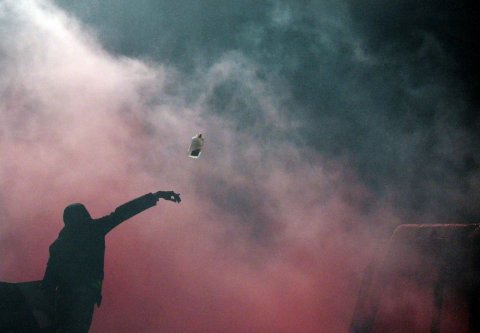
In November 2013, the first spark of the Ukrainian protests took place when President Viktor Yanukovych backed away from a trade deal with the European Union and opted to strengthen ties with Russia, Ukraine's long-standing economic partner since the days of the Communist Soviet Union.
Though Yanukovych's move angered pro-Western Ukrainians, who wanted to see their country move closer to Europe, EuroMaidan didn't grow into a full-blown revolution until several protesters - students and journalists - were attacked and beaten by police. Hundreds of thousands of Ukrainians then poured into Independence Square in Kiev to protest police brutality, with numbers swelling to nearly a million in early December.
Since then, EuroMaidan has grown into something far bigger than just an angry response to the fallen-through EU deal. It's now about ousting Yanukovych and his corrupt government; guiding Ukraine away from its 200-year-long, deeply intertwined and painful relationship with Russia; and standing up for basic human rights to protest, speak and think freely and to act peacefully without the threat of punishment.
Ruslana's significance may lie in her ability to act as a personification of Ukraine's ambitions. During the protests, her straightforward speeches pressing for the government to give in to the demands of the people - and her energizing performances onstage at the square - have helped bring together the protesters around the human needs for song, dance and freedom.
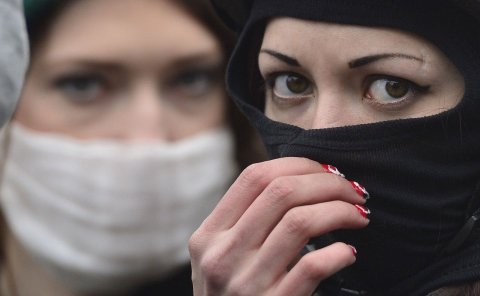
Lyzhychko was born in Lviv, the nation's second largest city, in the western region of Ukraine, where anti-Russian and anti-Yanukovych sentiment is strong. Her father was from the Carpathian mountains, home of the Hutsuls - an ethnic group of mountain dwellers known for their energetic dances, distinct accent, and upbeat music.
Ruslana's roots have inspired her musical style, a blend of modern pop and ethnic beats. She has incorporated ancient Hutsul instruments in her music, such as the trembita, a long wooden horn used to signal deaths and is played at funerals and weddings.
Oleksandr Ksenofontov, Ruslana's husband and producer, has worked closely with his wife of 18 years throughout her musical development. It was this ethnic Hutsul theme that became their ticket to fame. "We went to Moscow to meet with a producer on new songs," Ksenofontov told Newsweek, "and he told us, 'Why are you two looking at Moscow, when you have at hand the unique Carpathian mountain people?' Without hesitation we went on an expedition to the mountains, and a few months later the 'Hutsul project' was born."
After winning the 2004 EuroVision contest with her hit, "Wild Dances" - with lyrics written by her husband and producer, Oleksandr Ksenofontov - she became instantly famous both in Ukraine and throughout Europe. "Wild Dances" opens with the wails of trembitas and the intense pounding of drums, accompanied by shouts of "Hey!"
The song topped the European charts for 97 weeks and stayed at number one in Belgium for 10 weeks. Her album, Dyki Tantsi, became the best-selling Ukrainian album ever. Ruslana received a World Music Award later that year and became the first artist from a post-Soviet country to receive a platinum disc.
As a result, Ruslana hasn't struggled as an artist for the past decade. Though she claims she "hated" politics, her musical success helped her become synonymous to Ukraine.
A Ukrainian tourist website describes Ruslana as "a symbol of Ukraine. [A woman who is] fragile, but full of wild energy... who has made great efforts and talent to make talk about Ukraine around Europe."
She became politically active during the Orange Revolution, the democratic protest movement that shook Ukraine 10 years ago, served as the UNICEF Goodwill Ambassador in Ukraine in 2005 and 2006 and as a deputy in the Ukrainian parliament, Verkhovna Rada, for the Our Ukraine Party in 2006 and 2007.
Today, many Ukrainians see Ruslana's devotion to EuroMaidan as inspiring and admirable. "She has everything. She is prosperous. What we see here [at EuroMaidan] is that a lot of people have something to lose. They have money or some kind of business," Yevgeniy, a cafe owner present at the Maidan, told news.com.au.
"During the Orange Revolution, I stood on the Maidan every minute, as now I stand at EuroMaidan," Ruslana told Newsweek. "Of course, I took an active part [in the Orange Revolution], but it was different. Ukrainians had a leader. Now we don't, and even more so, a leader won't be accepted and the people aren't looking for one. Today, the people are struggling for themselves."
When asked about the current state of affairs at the Maidan, Ruslana told Newsweek in an e-mail, "The situation has changed." "The peaceful protests of citizens have stopped being peaceful," she continued. "We no longer sing or dance, despite the severe cold. We understand that today the fate of the country [that has taken] several decades to come hangs in the balance. Instead of singing, we pray."
Indeed, much has changed. At the beginning of the movement, protesters peacefully held their ground with smiles, goodwill and music. Now, the scene has transformed into a war zone - the square riddled with ice, burned carcasses of trucks and buses, half-destroyed barricades, tents, shoddy groups of protesters hurling Molotov cocktails.
Plenty of protesters - many in their early 20s - have been beaten and several have been killed. A large number have been jailed or reported missing.
Yanukovych has accepted the resignations of Prime Minister Mykola Azarov and his cabinet. Senior positions were offered to members of the opposition but were rejected. And the Ukrainian parliament voted to annul a recent draconian antiprotest law that had allowed authorities to treat even peaceful protesters as criminals.
But, like Ruslana onstage, the Maidan protesters don't tire. They wait for the cracks in Yanukovych's government to appear.
During the Orange Revolution, protesters united around one man, Victor Yuschenko, who would later be voted president. EuroMaidan is different. There is no single leader and the people don't really seem to want one.
Though EuroMaidan is a grassroots movement started by unnamed students and activists, many who have become leaders were already famous for doing something else. Ruslana is one. Others include a former boxing champion, Vitali Klitschko, the head of the opposition party; musicians Arseniy Yatseniuk and Sviatloslav Vakarchuk - lead singer of Okean Elzy, one of the most popular bands in Ukraine.
Vakarchuk became involved in politics during the Orange Revolution, writing the song "Vstavai" - which means "stand up" or "rise up" - for the movement, (which he performed at EuroMaidan in December). The 38-year-old sports a degree in theoretical physics from Lviv University, and served as a minister of education and science in Ukraine after the 2004 revolution.
Some have referred to Vakarchuk as the new Taras Shevchenko, Ukraine's most famous nationalist poet. Ruslana, meanwhile, has been called "Kiev's Queen of the Night" and has even been compared to Katniss from the Hunger Games. Yet she is a musician-turned-activist, not the other way around. The Russian feminist punk group Pussy Riot, on the other hand, was formed purely to make political statements through performance art to denounce Putin's authoritarian methods and government corruption.
What these musician-activists have in common is their ability to publicize their views heard across the world. Pussy Riot started out as a little-known girl group screaming anti-Putin punk songs in public spaces and became world famous after three of its members were jailed in 2012. Some consider Ruslana, Pussy Riot and the Ukrainian topless feminist group Femen mere attention-seekers, but such prominent cultural figures are capable of making a far-reaching political impact.
"A public person, musician or artist should exercise their civic activism to be the voice of the people," Ruslana told Newsweek. "As they listen to us, we are respected, and our opinions are respected. We often form opinions of our viewers and listeners, their thoughts, emotions, lifestyles and more. Today... public figures must be responsible for the future of Ukraine and not remain indifferent."
Ruslana has been far from indifferent. "This is not a show; this is real life. What we do at the square today is important for our life," she said. "I am being absolutely honest. I will set myself on fire at the Maidan Nezhalezhnosti, if the situation does not change."
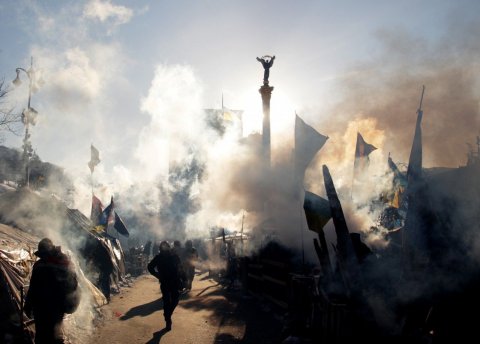
Some don't take Ruslana seriously. She has been called "silly," irrelevant, and a "clown." Others don't find Ruslana as noble as some make her out to be - and believe much of her efforts are driven by her need for publicity.
One critic, a Ukrainian who spent days recording the Maidan protests, noted Ruslana hasn't released a successful album in 10 years. "Granted, what she is doing - her public persona - is helping to galvanize the movement," the student, who asked to remain anonymous, told Newsweek. "But her private motives are far from it." He described her appearances at Maidan as little more than "fake enthusiasm."
"Vakarchuk's main subject of interest is Vakarchuk," said the journalist Graham Phillips, who writes a regular blog about Ukraine's politics. He was known for "a perceived greater interest in image and posture than really getting involved with the graft of Ukrainian politics."
Anatoli Murha, a Ukrainian musician who plays the bandura - a string instrument shaped like a guitar but sounding like a harp - met Ruslana in 2012, when she headlined a benefit concert for the Philadelphia-based Ukrainian Selfreliance Federal Credit Union's 60th anniversary. He takes a different view.
"Some people look at her as a pop star, but in fact not many people know that she graduated with a degree in choral conducting," Murha told Newsweek. Ruslana graduated from the Lviv Conservatory as a classical pianist and symphonic orchestra conductor. "Her knowledge of music is incredible. Watching her work with her musicians and dancers is like attending a leadership-training seminar - but without suits and ties."
"She brings her motivation from the stage to the people in the audience," said Murha. "The energy and emotion she has shown during EuroMaidan is indicative of her. It's natural and she believes in it."
In the past several weeks, Ruslana has traveled around Europe to speak about the political situation back home and garner support. Ruslana insists she'll be devoted to the cause until a resolution has been reached, and peace has returned to the streets of Kiev. "I am telling you, I will not go anywhere, nor do I plan to do so in the future, I will dedicate all my life so that this regime and this system are gone forever," she said.
"I'm on the Maidan day and night," Ruslana said. "I am planning to visit Munich and Berlin soon to conduct meetings, peaceful actions and press conferences. But even then, my visits are always related to the Maidan. I cancelled all concerts and recordings to be on the Maidan."
Like the movement itself, Ruslana's endurance has been tested, but she remains steadfast onstage. Whether her energy and dance will keep everyone's spirits up until the presidential elections next year remains to be seen - but so far, she appear to be holding up.
"Of course, I'm not happy with the fact that my wife is in the cold eight to ten hours all night, and then working all day," Ksenofontov told Newsweek. "But I cannot deny Ruslana if she is taken by something. She's extremely emotional and impulsive. And if she misses her enthusiasm, she will feel uncomfortable inside, so I let Ruslana do whatever she wants - whether I like it or not."



